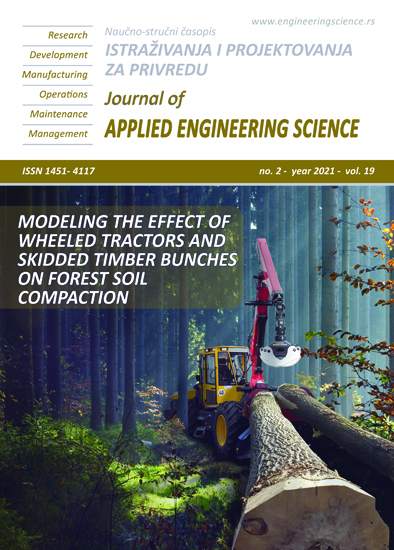PICKUP AND DELIVERY COSTS - PROPOSED OUTSOURCING MODEL
Abstract
The active introduction and modern technologies application in the transport market greatly affect all transport branches and the ways of their business. Availability and mass usage of the internet and web services create a new ambiance of trade through online sales respectively e-commerce. The increase in internet sales has a direct effect on the business of courier companies. The increase in the number of shipments, especially in the B2C (Business-to-consumer) segment, is putting increasing pressure on costs for companies that do pickup and delivery. Companies are trying to adapt their business to the new challenges and conditions that prevail in the transport market through different cost management models. One way to manage costs is to outsourcing costs. This paper proposes a model cost calculation in outsourcing services for pickup and delivery shipments based on the number of stops.
References
Ko, S. Y., Cho, S. W. and Lee, C. (2018) ‘Pricing and Collaboration in Last Mile Delivery Services’, Sustainability, 10(12), pp. 1–20. doi: 10.3390/su10124560.
Tiwapat, N., Pomsing, C. and Jomthong, P. (2018) ‘Last Mile Delivery: Modes, Efficiencies, Sustainability, and Trends’, in 2018 3rd IEEE International Conference on Intelligent Transportation Engineering, ICITE 2018, pp. 313–317. doi: 10.1109/ICITE.2018.8492585.
Duan, H. et al.(2019) ‘Post-consumer packaging waste from express delivery in China’, Resources, Conservation and Recycling. Elsevier, 144(January), pp. 137–143. doi: 10.1016/j.resconrec.2019.01.037.
Ding, Z. (2014) Evaluating Different Last Mile Logistics Solutions. University of Gävle, Faculty ofEngineering and Sustainable Development. Available at: http://www.diva-portal.org/smash/get/diva2:763544/FULLTEXT01.pdf.
Tibor, K. (2006) ‘Outsourcing decision support: a survey of benefits, risks, and decision factors’, Supply Chain Management: An International Journal. Edited by I. T. Oya. Emerald Group Publishing Limited, 11(6), pp. 467–482. doi: 10.1108/13598540610703864.
Sahay, B. S. and Mohan, R. (2006) ‘3PL practices: An Indian perspective’, International Journal of Physical Distribution &Logistics Management, 36(9), pp. 666–689. doi: 10.1108/09600030610710845.
Kosovac, A., Muharemovic, E. and Trubint, N. (2020) ‘A Cost Calculation Model for Outsourcing in Parcel Pick-up and Delivery by Commercial Postal Services Operators’, TEM JOURNAL-TECHNOLOGY EDUCATION MANAGEMENT INFORMATICS. HILMA ROZAJCA 15, NOVI PAZAR, 36300, SERBIA: ASSOC INFORMATION COMMUNICATION TECHNOLOGY EDUCATION & SCIENCE, 9(1), pp. 216–220. doi: 10.18421/TEM91-30.
Boyer, K. K., Prud’homme, A. M. and Chung, W. (2009) ‘THE LAST MILE CHALLENGE: EVALUATING THE EFFECTS OF CUSTOMER DENSITY AND DELIVERY WINDOW PATTERNS’, Journal of Business Logistics, 30(1), pp. 185–201. doi: 10.1002/j.2158-1592.2009.tb00104.x.
Kin, B. et al.(2018) ‘Modelling alternative distribution set-ups for fragmented last mile transport: Towards more efficient and sustainable urban freight transport’, Case Studies on TransportPolicy. World Conference on Transport Research Society, 6(1), pp. 125–132. doi: 10.1016/j.cstp.2017.11.009.
Thakur, R. K. (2016) Assessment Model for Outsourced Pick-Up and Delivery Operations. MIT Global SCALE Network. Available at: https://www.misi.edu.my/3.0/media-files/2015/12/Assessment-Model-for-Outsourced-Pick-Up-and-Delivery-Operations.pdf.
Deljanin, A., Colakovic, A. and Muharemovic, E. (2014) ‘Rationalization of Transport of Postal Shipment using GPS/RFID Technologies in Bosnia and Herzegovina’, Suvremeni Promet -Modern Traffic, 34(1–2), pp. 26–31.
Deljanin, A., Kosovac, A. and Muharemović, E. (2017) ‘Use of ITS System as a Track&Trace in Express Delivery in Bosnia and Herzegovina’, Suvremeni Promet -Modern Traffic, 37(1–2), pp. 30–35.
Jung, H., Lee, K. and Chun, W. (2006) ‘Integration of GIS, GPS, and optimization technologies for the effective control of parcel delivery service’, Computers and Industrial Engineering. Elsevier Ltd, 51(1), pp. 154–162. doi: 10.1016/j.cie.2006.07.007.
Čaušević, S. et al.(2018) ‘Potentials and advantages of applying geographic information systems in various fields of traffic engineering’, in Road and Rail Infrastructure V. University of Zagreb Faculty of Civil Engineering, pp. 1285–1290. doi: 10.5592/co/cetra.2018.735

